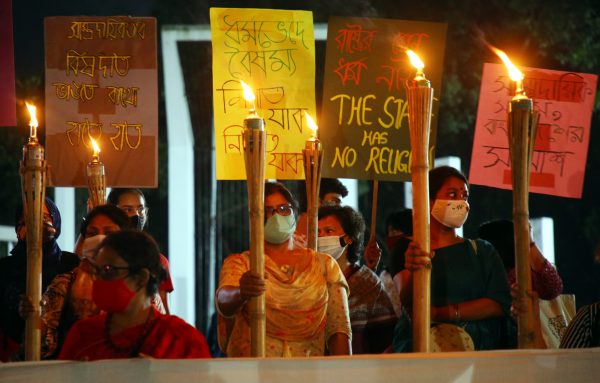These attacks included the vandalism and arson of 559 houses and at least 1678 temples, idols and places of worship. The immediate cause of the recent violence was the defamation of the holy Quran, which was placed on the knee of the Hindu god Hanuman.
The masterminds behind these attacks have an agenda of political opportunism and economic benefits. They are not motivated by Hindu or Islamic religious beliefs, but by criminality. Some claim that these anti-government forces strategically attack minorities to put pressure on the government. Counter-narratives purport that the government takes advantage of this chaotic situation to marginalise opposition. It is apparent that ruling party activists are in some cases involved in these attacks and the government has tended to turn a blind eye.
In many cases, the government loses the lawsuits filed after each attack on minorities because the law is designed to arrest opposition members, rather than prosecute perpetrators. Bangladeshi human rights organisations have agreed that the government has been negligent in protecting the country’s Hindu community.
Economic interests provoke communal violence. In several cases, human rights groups found that the attacks on several Hindu temples in Bangladesh were well-planned, with the aim of grabbing the community’s land. The Vested Property Act of 1965 has been used to grab Hindu property. Human rights groups and civil society activists have long urged successive governments to repeal this act. In response to these demands, the governing Awami League amended this act to the Vested Property Return Act of 2013, which enables confiscated properties to be reclaimed by their original Hindu owners. However, minorities have not experienced the benefit of this act yet.
The mob attacks on Hindu temples and houses involve socio-religious and historical factors. Feelings of proxy-victimisation, religious hatred and colonial legacy shape anti-non-Muslim sentiment in Bangladesh. Historically, Pakistan and India were divided based on the two nation theory. Pakistan was created exclusively for Muslims and India was for Hindus. These sentiments are still deeply rooted.
Though Bangladesh broke away from Pakistan and emerged as a secular nation-state in 1971, it still bears signs of opportunistic majoritarian politics, especially after the assassination of the country’s first president Sheikh Mujibur Rahman in 1975. Post-1975 Bangladesh has witnessed the rise of Islam as the state religion. Since then, Islamist narratives have become part of politics. Even though secularism was restored in the constitution in 2011, Islam remains as the state religion. This ambiguity shows the divided nature of the country’s population, which hurts the imposition of equal rights for minorities.
Local clerics, who are indigenous to the land, used to have authority over the interpretation of the holy texts of Islam and could influence people’s behaviour. Due to increasing globalisation, these local clerics have lost their sway and outside leaders or scholars have taken control over the interpretation of the text, which sometimes clashes with the spirit of multi-faith harmony in the country.
Feelings of victimisation are one of the top causes of radicalisation. This feeling of victimisation can also be proxy-victimisation. Neighbouring India and Myanmar both persecute Muslims. Videos of this persecution are rampant on social media, which generates feelings of proxy-victimisation. A study on radicalisation in Bangladesh revealed that Muslim persecution in India and Myanmar have helped to radicalise youths.
Religious differences and a communal mindset are the key factors behind the October attacks, which have broken the trust between Muslims and Hindus in Bangladesh. To rebuild this trust, the government needs to go beyond simply allocating money to reconstruct Hindu houses and temples.
In the long term, the government needs to introduce multifaith education into the national curriculum along the line of the constitutional spirit of Bangladesh. The curriculum needs to be updated to produce critical thinkers, rather than rely on rote memorisation. At the same time, the government should conduct research to find out why an increasing number of people are subscribing to violence. Bangladesh needs to offer more inclusive state policies that incorporate all people, including political dissents and religious minorities.
As a short-term strategy, the government should engage academics to hold inter-faith dialogues in conflict-prone areas, initiate cultural exchange programs for youths and use popular religious scholars to spread messages of peace and solidarity. Perpetrators must be brought to justice. Without immediate government measures, the future of minority rights and livelihoods in Bangladesh is grim.
Shafi Md Mostofa is Assistant Professor of World Religions and Culture at the University of Dhaka and an Adjunct Lecturer at the University of New England, Australia.

